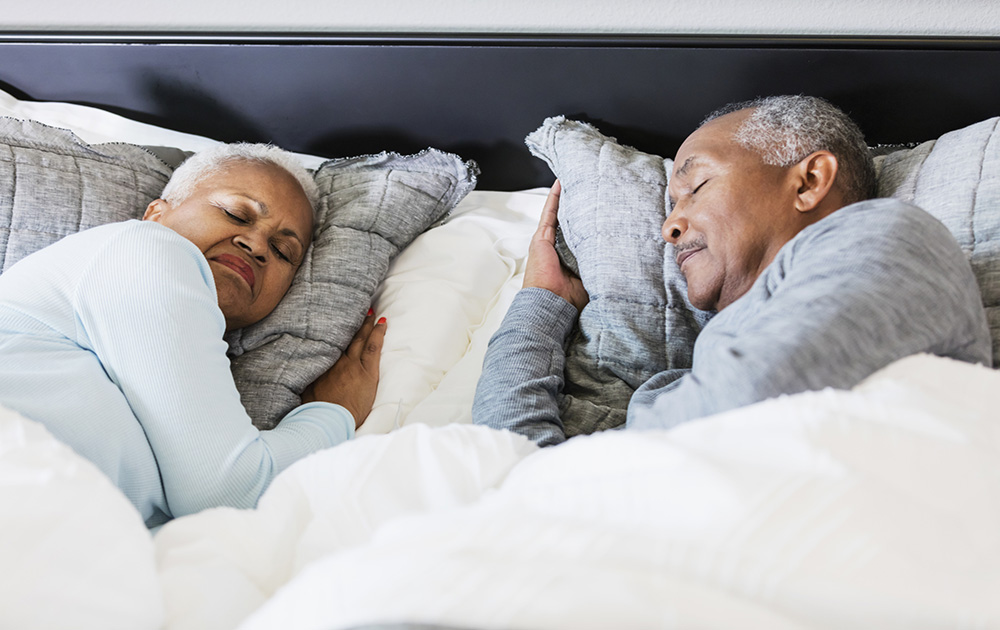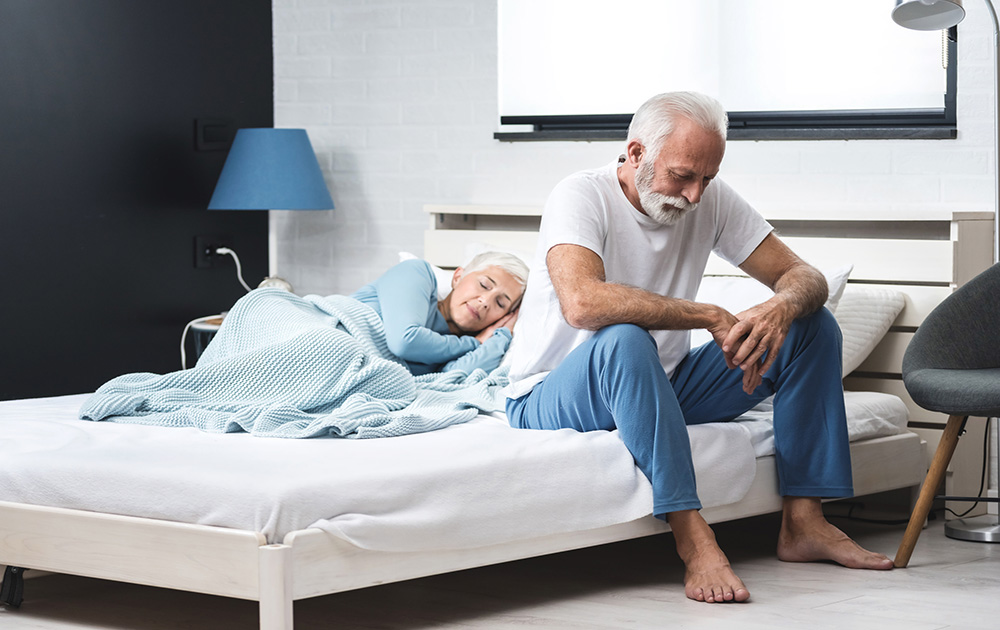
Your Most Common Hospice Questions Answered
April 14, 2023
Understanding Non-Emergency Medical Transportation: More Than Just a Ride
June 5, 2023Sleep Tips for Older Adults: A Caregiver’s Guide to Supporting Senior Sleep Health
Table of contents
- Do older adults need more sleep than younger adults?
- The health effects of lack of sleep and aging
- Sleep tips for older adults
- When to see a healthcare provider
- Parentis Health supports senior wellness
Getting a good night’s sleep is integral to maintaining overall wellness. However, our sleep needs can change as we get older, resulting in sleep difficulties that can affect older adults’ health.
In fact, researchers estimate that between 40% and 70% of older adults experience chronic sleep issues, with up to half of cases going undiagnosed. Fortunately, those same researchers also come up with several evidence-based sleep tips for older adults to help them enjoy the restorative slumber they need.
By understanding the unique challenges seniors face, you’ll be better equipped to help your loved one overcome sleep obstacles, improve their sleep quality, and, in turn, enhance their quality of life.

Do older adults need more sleep than younger adults?
Senior adults don’t necessarily need more sleep than younger adults. Generally, adults of all ages require approximately 7 to 9 hours of sleep per night to maintain optimal health and functioning. However, as people age, their sleep patterns may change. They might experience more difficulty falling asleep, staying asleep, or achieving deep, restorative sleep.
Some older adults may find themselves waking up more frequently during the night or experiencing lighter sleep than when they were younger. These factors can lead to a perception that they need more sleep, while in reality, they need better quality sleep.
That’s why it’s essential to address any sleep issues they might be facing and to prioritize good sleep hygiene to improve the overall quality of their rest.
Sleep patterns are controlled by the body’s circadian rhythms, which are regulated, in part, by light. Research shows that many seniors aren’t always getting the amount of exposure to sunlight that they need to keep their circadian rhythms on track. This is particularly true for seniors who live in nursing homes or those diagnosed with dementia.
In addition, older adults’ sleep patterns can be affected by changes in the production of hormones, such as melatonin and cortisol.
Externally, sleep issues can be related to the side effects of medications. Many prescription medications, such as those commonly taken for high blood pressure, can affect sleep. Additionally, medications that increase urination can cause seniors to wake frequently to use the bathroom.
The health effects of lack of sleep and aging
Lack of sleep can have significant adverse effects on the health of older adults. Inadequate sleep can lead to both short-term and long-term consequences that can impact their overall well-being, such as:
- Higher risk of accidents or falls
- Irritability or mood changes
- Exacerbating health issues
Furthermore, studies have shown that disturbances in seniors’ sleep patterns have been associated with having more depressive symptoms, a higher body mass index, and more signs of cognitive decline.
That’s why it’s crucial for older adults and their caregivers to prioritize good sleep hygiene and address any sleep issues to maintain overall health and quality of life.
Sleep tips for older adults
Assisting your senior parent on their journey to better sleep begins with helping them to incorporate effective strategies into their daily routine. Let’s explore a variety of practical tips that can help older adults achieve the restorative rest they need.
Diet tips for better sleep
- Limit caffeine from coffee, tea, soda, or chocolate late in the day.
- Avoid alcohol before bedtime. While it might initially make you feel sleepy, it will disrupt sleep patterns in the long run.
- Limit all liquids 1-2 hours before sleep to minimize the number of times your parent needs to wake up to use the bathroom at night.
- Have a light snack before bedtime, such as yogurt or warm milk, but avoid a big meal or spicy food that can cause indigestion.
- Cut down on foods high in sugar or refined carbohydrates during the day. These can cause blood sugar swings that can interrupt sleep.
Lifestyle tips for better sleep
- Keep a regular bedtime routine, even on weekends or while traveling.
- Develop a soothing bedtime ritual with activities your parent enjoys, such as taking a bath, listening to music, or reading a book.
- Get outside for some natural light during the day (but don’t forget to practice sun safety!)
- Minimize artificial light at night, such as from a TV, computer screen, or e-reader.
- Encourage your parent to exercise lightly during the day according to their ability.
- Help your parent address their stress levels. Stress, anxiety, and worry can all keep seniors up at night.
- Skip the afternoon nap. A short nap is fine if your parent sleeps well at night, but not if they’re having trouble sleeping.
Environmental tips for better sleep
- Make sure your parent’s bedroom is quiet, dark, and a comfortable temperature.
- Some people become more sensitive to light and noise as they age. A sound machine, earplugs, or a sleep mask may help.
- Encourage your parent to get out of their bedroom during the day. That way, their brain will only associate the room with sleep rather than using the computer or watching TV.
- Try more pillows to help prevent body aches. A small pillow between the knees or under the small of the back can help your parent rest more comfortably.
- Move bedroom clocks out of view. Not only do they put off light, but watching the clock at night can cause anxiety.
When to see a healthcare provider
If your parent has tried these sleep-improving tips for older adults and is still experiencing insomnia or daytime sleepiness, they should see their primary care provider. A healthcare provider can evaluate any potential health or medication concerns and provide referrals for a sleep study or other treatments as needed.

Sleep study
If snoring, muscle movements, or other issues are causing your parent to wake up frequently at night, their provider may order a sleep study. Also known as polysomnography, it is a medical test performed to diagnose and evaluate sleep disorders.
Sleep studies can be done in a specialized lab or at your parent’s home. The study uses sensors to measure brain activity, eye movements, heart rate, breathing patterns, oxygen levels, and muscle movements throughout the night.
After the sleep study, a sleep specialist will analyze the collected data to determine if there are any disruptions in the individual’s sleep, such as sleep apnea, periodic limb movement disorder, or other sleep-related issues.
CBT for sleep
Cognitive-behavioral therapy (CBT) is a form of talk therapy that is also used to treat sleep problems. It treats sleep problems by addressing the negative thoughts, worries, and behavior that prevent you from sleeping well at night. Multiple studies have shown that CBT can help effectively treat sleep disturbances in older adults—often as well as medication, but without the risks or side effects. CBT can be conducted individually, in a group, or even online.
Sleep medications
Insomnia is a common complaint among adults, and many people reach for over-the-counter or prescription sleep medications to cure their nighttime woes. While sleeping medications can be effective in the short term, they can actually make insomnia worse in the long run. They also pose a danger to older adults as they can cause adverse effects such as:
- Confusion
- Loss of balance, dizziness, or falls
- Fatigue
- Stomach upset
Parentis Health supports senior wellness
Supporting senior sleep health is an essential aspect of ensuring the overall well-being of our loved ones as they age.
By implementing practical sleep tips for older adults, seeking professional guidance when necessary, and fostering a healthy sleep environment, we can help seniors overcome sleep challenges and enjoy a better quality of life.
Parentis Health is here to help you take care of your senior parent’s healthcare needs every step of the way, whether it’s transportation to medical appointments, home healthcare, in-home caregivers, residential care, or hospice.
Contact us today to discuss how we can help!

